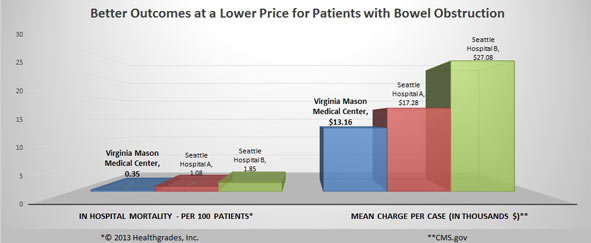A small bowel obstruction occurs when your small intestine is partially or completely blocked. The blockage prevents food, fluids, and gas from moving through the intestines in the normal way and may cause severe pain.
The most common cause of small bowel obstruction are adhesions from previous abdominal surgeries. Small bowel obstruction may also be caused by gallstones, hernias, tumors or inflammatory bowel diseases, such as Crohn's disease.
Because of the serious complications that can develop from small bowel obstruction, seek immediate medical care if you have severe abdominal pain or the other symptoms listed below. For questions or to schedule an appointment with a gastroenterologist, call (206) 223-2319.
Symptoms of Small Bowel Obstruction
Signs and symptoms of small bowel obstruction can include:
- Crampy abdominal pain that comes and goes
- Nausea
- Vomiting
- Diarrhea
- Constipation
- Inability to have a bowel movement or pass gas
- Swelling of the abdomen
Diagnosing Small Bowel Obstruction
Tests and procedures used to diagnose bowel obstruction include:
- A physical exam where your doctor will ask about your medical history and your symptoms. He or she will also do a physical exam to assess your situation.
- Imaging tests to confirm diagnosis of intestinal obstruction. Your doctor may recommend an abdominal X-ray or CT scan. These tests also help your doctor determine if the obstruction is partial or complete.
Treating Small Bowel Obstruction
A small bowel obstruction is a medical emergency that requires immediate medical attention. The appropriate treatment depends on the severity of the obstruction, but generally requires hospitalization.
Improvements in imaging of small bowel obstructions now allow for confident distinction between simple obstructions, that can be treated conservatively, and obstructions that are surgical emergencies.
Conservative treatment involves insertion of a nasogastric tube, correction of dehydration and electrolyte abnormalities. Opioid pain relievers may be used for patients with severe pain and special medications may be administered for vomiting.
Most patients do improve with conservative care in two to five days. However, in some occasions, the cause of obstruction may be a cancer and in such cases, surgery is the only treatment. These patients undergo surgery where the cause of the obstruction is removed. Individuals who have small bowel resection usually stay in the hospital a few additional days until they are able to eat and walk.
Why should you go to Virginia Mason for Small Bowel Obstruction?
Virginia Mason has earned Healthgrades' Five-Star rating for bowel obstruction surgery nine years in a row.
At Virginia Mason's Digestive Disease Institute, patients with small bowel obstruction are treated with not only better outcomes (lower mortality rate) than other local medical institutions, but also at lower costs.
